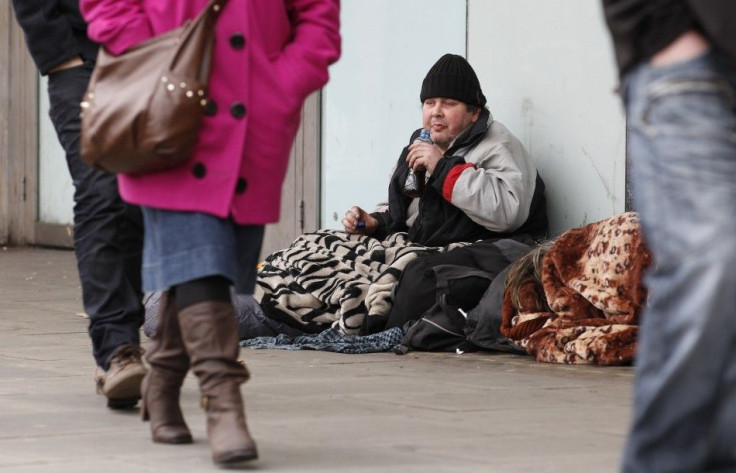Homelessness Rising In England To Olympian Heights

While the world focuses on the summer Olympics in London, an increasing number of Britons have a more pressing issue to worry about -- many do not have homes and live on the streets.
According to data management firm SSentif Intelligence, homelessness has jumped by 14 percent over the past year and by 25 percent in the past three years in England – the victims of a ‘perfect storm’ of misfortunes, including unemployment, rising housing prices and drastic cuts in government spending on social welfare.
All regions of England, except the Northeast, recorded increases in homelessness over the three years since 2009, while the East suffered the highest spike, 44 percent.
On the whole, SSentif said 50,290 families and individuals were classified as homeless, up from 40,020 in 2009.
Conversely, government spending on homelessness has dropped from £213.7 million ($335 million) to £199.8 million over that same period.
“Whilst these figures are perhaps not surprising given the state of the economy, some of the results for specific councils are quite shocking,” said Judy Aldred, managing director of SSentif.
“By analyzing the data at council level we were able to highlight some areas that are showing much greater increases than the national average.”
SSentif cited, for example, that in the Midlands city of Birmingham, homelessness has jumped by 25 percent over the past three years, while spending to tackle the problem has fallen by 29 percent.
In some parts of London, including Hounslow, Croydon and Waltham Forest, the homeless numbers have doubled in just three years.
Duncan Shrubsole, the director of Crisis, a British housing charity, blamed social welfare cuts.
“These homelessness figures are very worrying and highlight that whilst demand is rising, spending on local homelessness services is being cut,” he told UK media.
“We are building just a fraction of the new homes we need, while government cuts to housing benefit are hitting households across the country.”
Moreover, homelessness is likely to keep moving up.
Another British organization, Shelter, a homeless charity, noted that Britain is the third least affordable nation in the European Union, with one-sixth of the population spending more than 40 percent of their income on rent, mortgage payments and other costs associated with their home (only the Greeks and Danes pay a higher proportion).
“These figures are the evidence that the UK housing market is deeply dysfunctional',” said Campbell Robb, Shelter’s Chief Executive.
“'With so many families spending huge amounts of their income on their rent or mortgage, people will be making daily trade-offs between food bills, filling the car tank with petrol, and paying their housing costs.”
Robb added: ‘And this is not set to get better any time soon. While the situation is bleak at the moment, a succession of governments failing to provide much needed affordable homes means that the future facing our children and our children’s children is only set to get worse. Housing is the largest monthly cost for most people, yet the affordability of housing is not getting the same attention as the monthly costs of other essentials such as food or fuel. We believe all political parties must recognize solving our housing crisis is as fundamental as health and education.”
However, a government official said the latest homeless data is misleading.
“These figures are a narrow and misleading snapshot. The bigger picture is that homelessness is actually lower than for 28 of the last 30 years -- and is half the average rate seen under the previous government,” said a spokesman for the Department for Communities and Local Government.
"We have maintained funding for homelessness grants at 2010/11 levels with £400 million over the next four years, and on top of that we announced an additional £70 million investment over the last year. Our strong safety net of support is keeping thousands of vulnerable people off the street and we are determined to take every opportunity to build on this.”
© Copyright IBTimes 2024. All rights reserved.





















